Why Lincoln is an inspiration
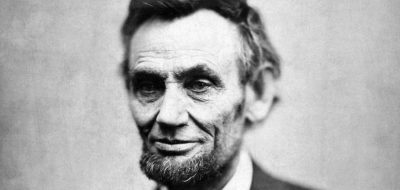
We must reject the idea that our struggles with depression disqualify us from our destiny. Our inner battles do not preclude us from achieving great things: they qualify us.
History testifies to this.
Martin Luthor King Jr was known to experience bouts of severe depression; Winston Churchill (pictured, below) suffered terribly with his ‘black dog’; Theodore Roosevelt suffered a breakdown after his wife and mother died. And even Jesus is described in the Bible as a man of suffering who was acquainted with sorrows.
Public triumphs are almost always the result of private victories. Just ask Abraham Lincoln!
We all know about his public successes including the key roles he played in the eradication of slavery and the survival of the United States. Yet we know very little about Lincoln’s personal struggles. Well-meaning books and movies about his life airbrush them out of his story to preserve his heroic, statue-worthy status. This comes at a cost. We look to these ‘unblemished’ heroes and wrongly conclude that their own battle scars make them unworthy of the same greatness.
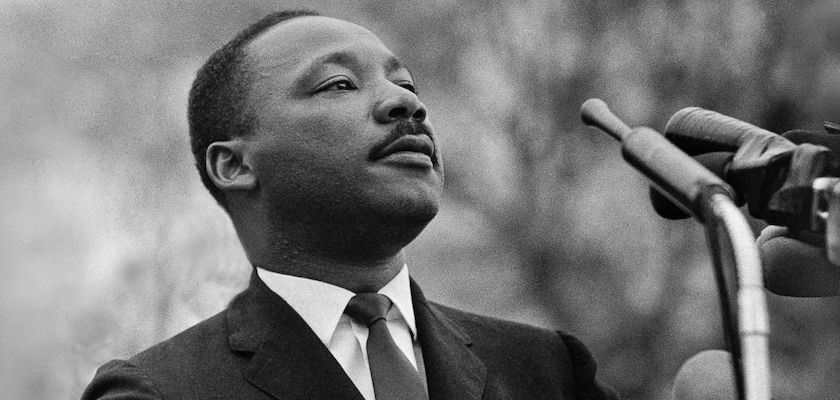
BOUTS OF DEPRESSION: Martin Luthur King Jr suffered mental struggles throughout his life.
Abe was intimate with despair. He suffered loss from an early age, including being regularly abandoned by his father and experiencing the death of his mother, sister, the love of his life and later two of his sons. This created a reservoir of grief in his soul leading him to be severely depressed. His friends wrote that he would “drip with melancholy as he walked”. At times they had to lock him in his room to prevent him from taking his own life.
This is what the man deemed by many to be the greatest American President endured behind closed doors. The key to his greatness, like so many men and women throughout history, was not that he was free from suffering – but that he did not surrender to it. Day by day, inch by inch, he fought back against the dark nights in his soul. This is the process that made him a great man and leader. It made gave him moral courage, resilience, strength and the emotional intelligence he needed to write those famous speeches that transformed a nation. It also gave him an unusual perspective. When the Confederates surrendered in 1865, giving up their attempt to split from the rest of the United States, Lincoln made it clear that he didn’t want any of their leaders or troops to be executed. He knew that compassion and kindness had healed his fractured soul and as such could heal a divided nation too.
So, if you are enduring a painful season now, don’t give up. Keep going. Take encouragement that your heroes once used every ounce of strength they had to get out of bed on their darkest days. At the lowest points in their lives, they were capable of achieving remarkable feats. You can, too.
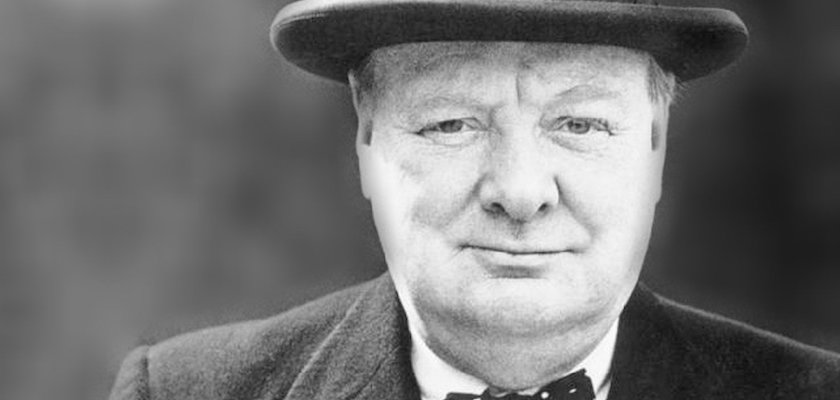
Chris Kerr is a legal industry executive and a columnist for Sorted.
Forgiveness: the ultimate act

The meanest of machines

Sorted's Tim Barnes-Clay reviews the BMW 3-Series M340d xDrive Saloon
Since its launch back in the decade of space hoppers and flared trousers (the 1970s for those of you who don’t know what I’m on about), over 15 million BMW 3-Series models have been sold.
Many of the sales have happened here in Britain, but rival cars like Audi’s A4 and Mercedes’ C-Class are constantly snapping at the 3 Series’ coattails. These motors keep BMW from resting on its laurels too much, which is good because it keeps the bimmer sharp.
Performance
BMW’s 3-Series line-up entails a bunch of petrols and diesels as well as the 330e hybrid. The engines can be massively powerful, and it’s the M340d xDrive I drove for this review.
The oil-burner costs over £53k and comes with a three-litre turbo unit. This powerplant produces 340PS, and with the help of a quick-shifting eight-speed auto gearbox, 0-62mph is realisable in 4.6 seconds.
What’s more, the top speed is 155mph, which is brisk enough for most folk – especially in this country with our 70mph ceiling.
Ride and handling
If a saloon car is your thing, then you’ll probably already know that the BMW 3 Series is legendary in this segment.
Even though the M340d xDrive is propelled by diesel, the car’s cabin is as quiet as a church mouse. There’s hardly any vibration from the engine, either. Much of the sound-deadening can be attributed to well-sealed window surrounds, double-glazing and a windscreen with acoustic glass.
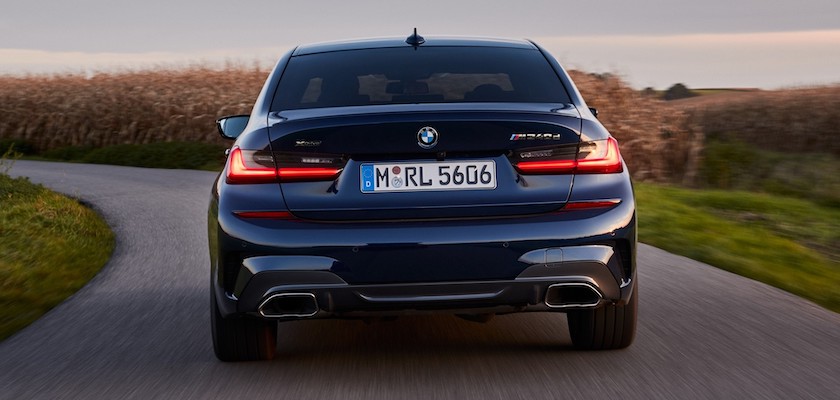
Fast Facts
Price: £53,420
Max speed: 155 mph
0-62 mph: 4.6 secs
Combined mpg: 46.3
Engine: 3.0-litre six-cylinder turbo diesel
Max. power (PS): 340
CO2: 159 g/km
The M340d makes light work of the UK’s well-worn road surfaces. It skips across potholes and sticks to corners like gum to the sole of your shoe.
Despite being known as a “compact” executive, the 3 Series is no small car. However, at the tiller, it feels lithe and light. The steering set-up makes driving the vehicle effortless, and the switchgear is intuitive, making the saloon perfect for trips around town or longer commutes.
Refinement
BMWs are refined; it’s in the German firm’s genetic material to be sophisticated. After all, what good is a bimmer with a devastating dearth of classiness? Okay, a 3 Series is not intended to be a Rolls-Royce, but a renowned Teutonic make is expected to have a certain finesse. The M340d xDrive doesn’t displease in this respect.
The seats are supportive, and the cabin offers a close to perfect driving position. A good range of seat and steering wheel adjustment helps with getting comfy in the driving pew.
Add BMW’s awesome iDrive infotainment tech into the mix, and life is good. The rotary controlled system is utterly intuitive – almost foolproof to use. Indeed, many automakers have tried, few have succeeded in making their infotainment systems as good as the iDrive.
Elsewhere, BMW’s superlative build quality and insulation described above are in attendance. So, you certainly won’t feel fleeced if refinement is high on your list of car “must-haves”.
Behind the wheel
Well, anyone clued-up with the way BMW does things will feel unperturbed here. High-grade materials, deftly designed surfaces and the driver-targeted composition of the cockpit characterise the performance aura of the 3 Series’ cabin.
Technology is abundant on the bimmer, starting with a sizable digital cockpit, which incorporates navigation. There’s also Apple CarPlay connectivity, live traffic data and Microsoft Office. Furthermore, a rear-view camera and parking sensors are fixtures on every BMW 3 Series model.
Overall, the M340d xDrive’s cockpit comes with controls that are in all the areas you’d expect them to be. It is a typically commendable effort from BMW, with no unpleasant surprises.
Space and practicality
I’ve already said that the 3 Series is a compact car, but there’s more room inside the BMW than you might imagine. It will seat five-up, although two adults in the rear will be more comfortable than three. This is due to the intruding transmission tunnel.
While it’s a low-slung saloon to get into (perhaps too low for some), the back doors are large, and there’s a good serving of legroom and headroom. Of course, you will also get your family’s belongings in the 480-litre boot. Sure, it’s not as practical as a hatchback or an estate, but I got five people’s worth of stuff in there on my family’s 200-mile test drive.
What’s more, the 3 Series has lots of side pockets in the load bay – and you can order luggage nets as an optional extra. Also, the BMW’s rear seats fold down if you want to load long or bulky items.
Running costs
As with most motors, the declared fuel economy statistics for the 3 Series differ depending on how sizeable the wheels and tyres are. But, as a rule, the bigger the wheels, the thirstier the car becomes.
The M340d xDrive on test here returns up to 46.3mpg, and emissions are relatively low (considering the car’s performance) at 159g/km CO2.
Vehicle safety and security
The BMW 3 Series attained the maximum five-star grade when tried and tested by Euro NCAP. It achieved a genuinely incredible 97 per cent score for adult occupant safety, with tallies of 87 per cent in both pedestrian and child safety. It comes factory fitted with Active Guard Plus, which comprises front collision warning with braking intervention and pedestrian recognition, speed limit assist and lane-departure alert. In addition, airbags all over the car increase protection further.
BMW works to improve and design the best systems you can get when it comes to vehicle security. But, let’s face it, it needs to – BMWs are sought after cars, and you don’t want yours pinched. The automaker doesn’t stop there, though; it also works together with the authorities in reacting to threats and forecasting new risks. So, be assured, you’re in excellent hands if you purchase or lease the awesome M340d xDrive.
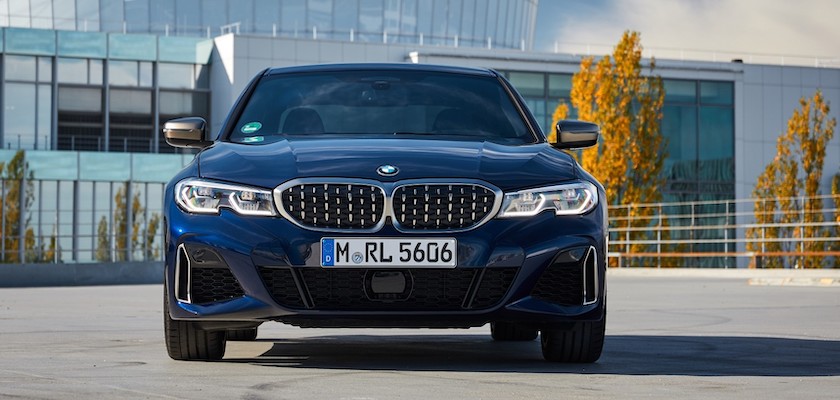
Follow Tim Barnes-Clay on Instagram @tbarnesclay and Twitter @carwriteups
I am with Winston...

Our debt to 'Patch' Adams

What's the first thing you think of when you hear the word 'hospital' – and what pops into your head when a doctor's name is mentioned?
To me, these words conjure up images of cold white clinical buildings, illness, death and generally not somewhere you want to be. However, thankfully in the 21st Century, these worries can usually be put to bed, and we have the NHS to thank for a huge improvement in healthcare.
But in 1960s America, hospital treatment standards were poor. Hospitals were outdated and underfunded and as a result, staff were undertrained and disillusioned. Enter the healthcare system with an illness was something to fear as patients really had no idea what kind of care they were going to receive.
This lasted until an eccentric medical student, in his early 20s, started to look outside the box – and took it upon himself to change the face of hospital care.
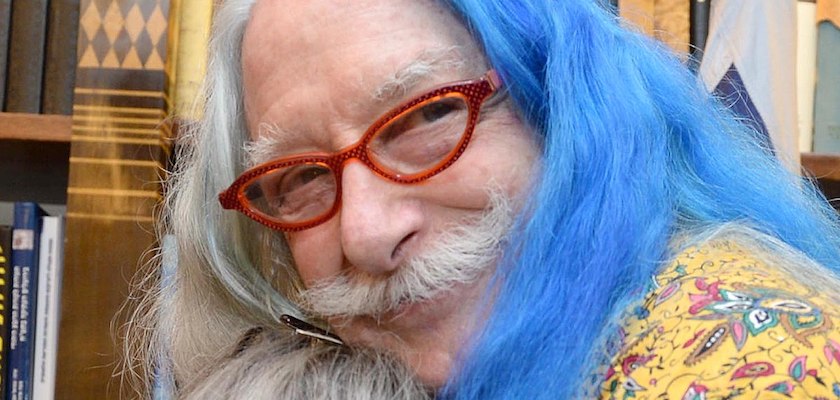
THE ENTERTAINER: Hunter 'Patch' Adams likes to make patients smile because it aids their recovery.
Hunter Doherty Adams was born in Washington in 1945, to parents Robert and Anna Adams. Father Robert was an officer in the US Army. While stationed in the former West Germany, Robert suddenly died. At the time, Hunter was only 16-years-old. With no ties to Europe, the family moved back to the US where teenager Adams experienced severe bullying at school. The relentless abuse and torment he received led Adams to develop depression and anxiety, attempt suicide and be hospitalised three times in one year.
During his stays in various hospitals, Adams observed how patients were being treated. He saw how robotic and emotionless medical care had become and as David Stout noted in his New York Times article: "Adams saw medicine itself as critically ill from an emotional void between doctors and patients, the days of an old-fashioned personal house call had vanished, and the near-industrialization of medical treatment had emerged."
It was during his time in hospital that he began to use his nickname after one of the patients dubbed him 'Patch' – after their evolving friendship had patched up the loneliness in his life.
After significant improvements in his mental health and spurred on by the things he had experienced in hospital and the people he had met, Patch decided to pursue a career in medicine. He completed pre-med coursework at the University of Washington and progressed on to study medicine at Virginia medical college. It was during his time at medical school that Patch really saw the terrible state that US hospitals were in and how patients were being treated. He saw seriously ill people receiving very basic levels of compassion, while empathy was replaced by numbers, figures and quotas that needed to be met at any cost. He also noticed a lot of patients were being discriminated against and denied certain treatments due to not having the correct medical insurance, or not being able to afford the right level of care they required.
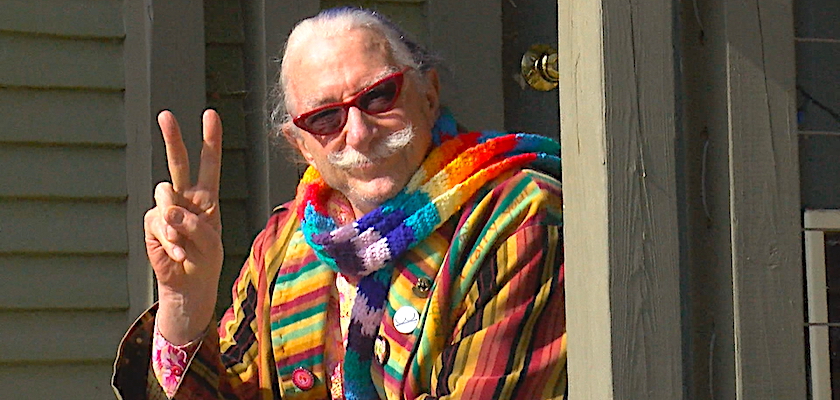
INTERNATIONAL RECOGNITION: Patch Adams was nominated for the 2021 Nobel Peace Prize.
Patch became determined to tackle this great injustice.
He believed a patients’ health was directly linked to the amount of regular human contact they received. Convinced this was an important dynamic in treating many conditions, he would sit and talk to the ill and infirm for hours, reassuring them, making them laugh and being there for them. This was something hospitals didn’t encourage at the time.
After graduating with a medical degree, Dr Hunter ‘Patch’ Adams set the wheels in motion to create a free medical centre, which promoted the idea of spreading laughter, positivity, and compassion to all who required medical help no matter who they were.
Patch, his future wife, and some medical school friends founded the Gesundheit! Institute in 1971 as a free community hospital run by staff and friends and funded by donations.
Since its founding, this place of peace, compassion and medical excellence has provided care for thousands of patients and regularly runs 'clown travel expeditions' to underdeveloped parts of the world where Patch, his family, friends, and medical professionals provide free healthcare and comic relief dressed as sideshow clowns.
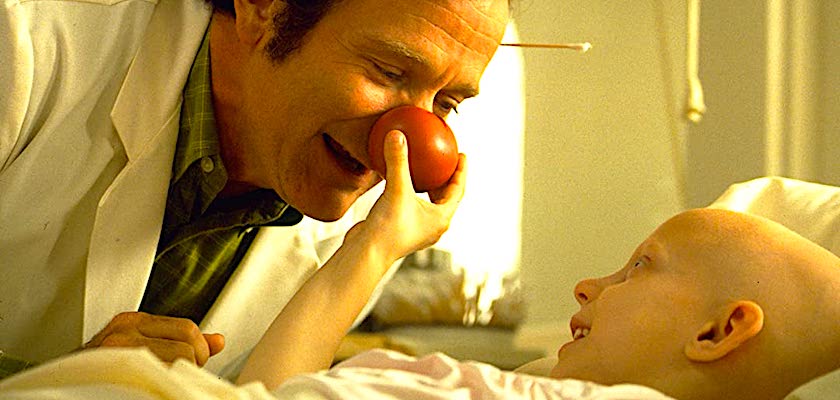
A HARD ACT TO FOLLOW: Robin Williams brought Patch's exploits to the big screen.
In 1998, Tom Shadyac directed a film based on this remarkable man's life. Patch Adams starred Robin Williams in the lead role and all monies paid to Patch were used to provide more resources for the hospital's patients.
Now 76, Adams has taken a step back from the everyday running of Gesundheit! to enjoy his semi-retirement, leaving the management of the hospital and the organising of a proposed 30-bedroom new hospital building to his two sons Zag and Lars Adams. But Patch hosts regular Facebook Q&As and is still to be seen wearing various bright and silly clown outfits almost every day in his quest to entertain people.
If you would like to learn more about Patch’s mission and the Gesundheit! Institute, please click here.
Louis Mason is a freelance journalist who regularly writes features and columns for Sorted.
Arise, the king of sketch
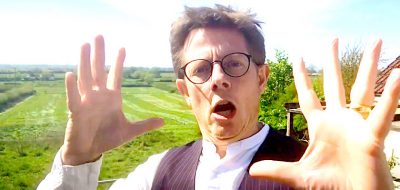
Ever wondered who’s behind the whacky doodles dotted throughout the printed version of Sorted? Val Fraser caught up with Andy Gray, a multi-talented illustrator with a quarter of a century of commercial experience of drawing pictures for storytellers and companies behind him. Her task was simple: to find out more about the man whose cartoons put a smile on the faces of our readers...
Recently, Andy Gray was invited to put pencils to paper and create representations of the bible characters which feature in the children’s book Whistlestop Tales, a tome written by Krish and Miriam Kandiah (and published by Hodder & Stoughton). Andy’s creative input to the project also included the typesetting, or as he modestly puts it: “I did the scribbles and layouts!”
Catching up with him when he wasn't drawing or administering his faith duties (yes, Andy is also a practising vicar), I asked him how this particular collaboration came about?
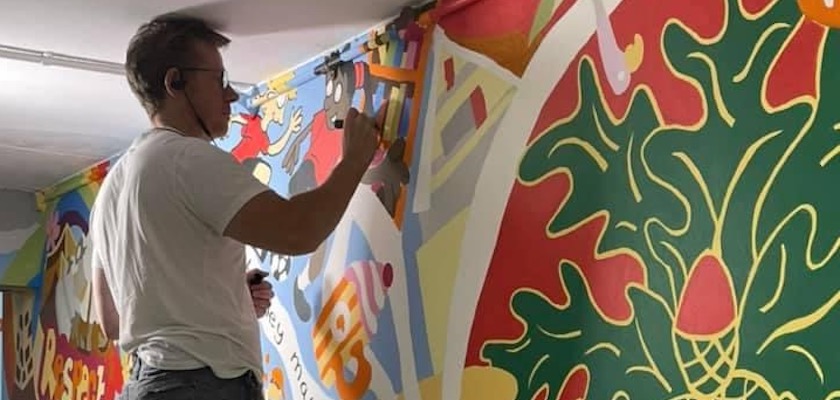
PICTURE OF CONCENTRATION: Andy Gray snapped while hard at work.
“An awesome bloke called Joe Fisher wrote a book through lockdown and asked on social media for an illustrator. Another awesome bloke, Andy Taylor, who knows Joe from Greenbelt, tagged me in the post. I illustrated for Joe. The story is a kid-friendly, focussed reflection in rhyme on the pandemic called When the Bugs Came. We turned it around in record time from a Kickstarter, to sending out in under three months.”
“Unknown to me, Joe was that pleased with it, he sent it to Hodder. And Hodder asked if I would do a sample piece for a couple of projects they needed illustrators for.”
And that, as they say, was that! Now Andy is working on a follow-up book for his friend Joe (appropriately titled When the Hugs Came).
“I don’t try hard to get work. I follow my nose, and my nose follows God," he explains. “Well, I guess that means I follow God since I’m attached to my nose! I just trust him. He’s the friend who will never leave me or forget me. And he’s done that since I was eight years old. It’s awesome and quite the adventure. You just have to follow each day; do what He says to do each day, and stuff happens.”
Whistlestop Tales is the first children’s book written by the Kandiah’s. They have brilliantly re-imagined 10 bible stories in an exciting global adventure, showing how a wonderful array of characters are swept up in God’s plan for the whole world.
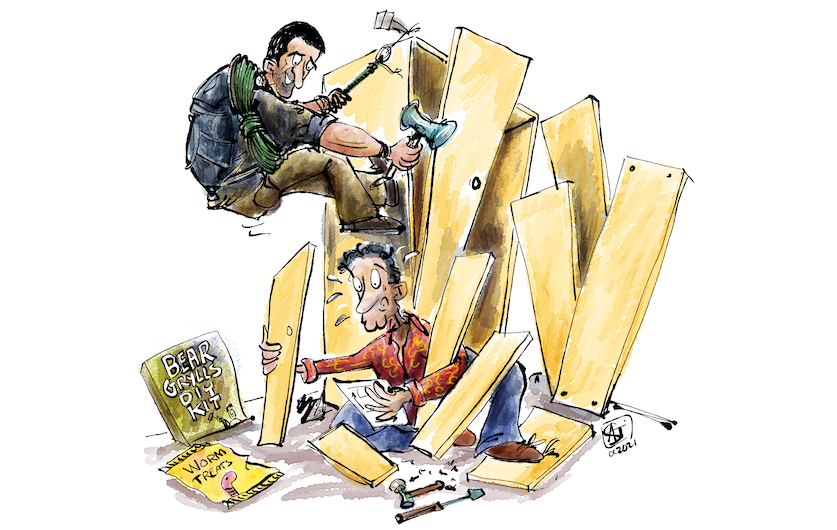
HAMMERED: this illustration graced the pages of the August-September 2021 edition of Sorted.
During his creative career Andy has worked on several children’s books; each one embraces a unique style. Some of his drawings seem very controlled, delicate and magical, while others are cute and whimsical. His fluffy animals look soft enough to stroke.
In contrast, the illustrations for Whistlestop Tales seem scribbly and a bit messy – more out of control and not unlike the ones readers of Sorted will be familiar with. It may appear they have simply exploded onto the page. It would be a mistake to think so, for each one has been forged in the painstaking process of immersive artistic expression. Each one is carefully crafted to tell a story in miniature, often laced with humour. The character’s facial expressions are priceless and Gray admits: “I can’t draw camels!” Often there are tiny details which reveal themselves only upon a second viewing.
In addition to illustrating books, Andy leads activities and events in schools. He seems at home in this playful environment and has designed elaborate murals which cover an entire wall, eight metres long by two metres tall!
The mural came about as a result of Andy’s work with the Diocese of Bath and Wells. He’d help them to create and develop ‘chat mat doodle sheets’.
He explained “The diocese's GoTeam came up with the idea of a printable placemat kind of thing; a verse, a bible reading and some questions. The idea is to help people just chat about the bible.
“The chat mats have ended up around the world, from schools to churches to prisons. We have over 40 so far, and are about to do a load with a slightly different style for young people. One of our ministers realised that it would look great in their church school on a wall that needed updating from a mural done 20 years ago.”
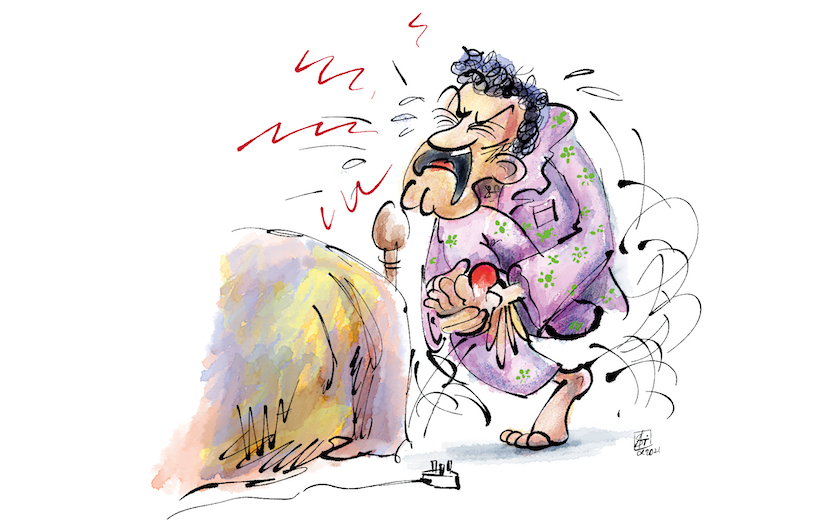
OUCH: Another of Andy Gray's wonderful magazine illustrations.
To create the fully customised mural (pictured, below) Andy tapped into the ‘school hive mind’.
“I got the school to work with all the kids to identify the main things that had meaning for the school,” he says. “I trawled the school paperwork digging out the values. And designed the chat wall for them – the idea being that the kids could think about the wall together. And prospective parents could be shown the school values as much as read about them in a pack.
“I did the design work and used augmented reality to transfer it to the wall. Emma King, the community worker employed by the church, and a regular face at the school, did the painting. Then I went back in and blacklined the whole thing. It took four days to design and colour. Two days to draw on the wall. Two weeks to paint (Emma was awesome). And another day to blackline.”

You can see Andy’s latest 'scribbles' in the new edition of Sorted, which hits the newsstands this Friday (15 October). To connect directly with Andy, click here and to check out the Whistlestop Tales click here.
Approval is all I seek

Attention, rather than respect, is our new currency. Our value, we now believe, comes from being noticed and as such we will stop at nothing to get more followers on social media, more attention from strangers and, if we are really lucky, more airtime on TV.
As such, we will do and say anything to grab the world’s attention, even if it has no benefit to our reputation. There is no such thing as bad publicity, after all. It matters not what we say as long as everyone hears it. So, we fight to be the loudest person in an already overcrowded and noisy room.
We will say the most controversial thing, straying to the far right or far left, doing whatever it takes to avoid that boring, unfollowed middle. Our comments will be ridiculous and so clearly wrong. Who cares, just as long as it gets those 10,000 retweets! Better that, we say than making an intelligent comment nobody reacts to.
Don’t call us ‘sensible’, ‘logical’ or ‘reliable’. What terrible insults! Such people don’t get noticed; how little they must matter.
It is better to be a Katie Hopkins than a Hannah More (who is that you ask? And that's the point I am making). So, we use clever phrases to insult people in authority, we tear down people’s character without ever meeting them, we substitute depth and meaning for re-tweetable soundbites and we rewrite history in order to grab a piece of it for ourselves. We will say more whilst wearing less; just notice us… please.
For a moment we feel good. We matter. We can sleep easily knowing that the world heard us. Except it was never really ‘us’ at all. With each Tweet or Post, the boundaries of ‘us’ get blurred until the man they notice is not who we really are at all.
So, what is there to do?
Let’s start by caring less about what strangers think and focus more on how we view ourselves. Let’s stop trying to get noticed by millions for the wrong reasons and be content with being recognised by a close few for the right ones. Let’s not live for the bright lights and fanfare of thousands but instead work diligently to master our crafts in a work setting where nobody is watching.
The great irony is, the men and women who made countless generations stand up and notice them, did just this.
Chris Kerr is an executive and advisor in the legal industry and a Sorted columnist.
OUT NOW: OUR LATEST ISSUE!

Boy, do we have a belter of an edition to close 2021 with!
An exclusive interview with Daniel Craig heads up the list of great articles published in the November-December issue of Sorted, as the star of James Bond's twenty-fifth film, No Time To Die, talks openly about playing 007 – and what his hopes and ambitions are now his 15-year spell playing one of the world's most famous characters is over.
We also have former Gladiators star, Warren Furman, revealing all about his former life as a TV star, as well as profiles of Liverpool manager, Jurgen Klopp, and Gerry McCann, the father of the abducted Madeleine, who was lost some 14 long years ago.
As well as these riveting reads, our Motoring columnist, Tim Barnes-Clay, has served up an end-of-year feast, focusing on three classic motors he thinks most blokes would like to own, and Christian writer, J John, has penned a moving feature about the enduring legacy left by Dietrich Bonhoeffer, a man of faith who did his utmost to bring about the downfall of Hitler.
As usual, our diverse family of columnists have also produced some insightful and witty insights that are guaranteed to provoke a reaction. So, enjoy the read – and here's to a great end of the year for all of us.
Sorted will be available in WH Smith and McColls newsagents from Friday 15 October. Alternatively, you can take out a subscription – and receive a personal copy for the next 12 months – by clicking here.
Fury: "God gave me victory"

Tyson Fury has said his astonishing heavyweight boxing victory at the weekend came about because of his resolute Christian faith – and because when he needed God most, his creator was there to "make his legs strong".
The British boxer fought Deontay Wilder for a third time in the early hours of Sunday morning and stopped the US fighter in the 11th round with a huge uppercut. It was the fifth time one of the boxers had been floored their absorbing contest – with WBC champion, Fury, on his knees twice during a dramatic fourth round.
After his stunning right hand had left his rival, the former champion, prostrate on the canvas, the British fighter told millions of watching viewers on either side of the Atlantic Ocean: "First of all, I would like to say thank you to my saviour, my Lord Jesus Christ. In the mighty name of Jesus, I won this fight tonight. I give Him the glory; He gives me the victory.
"He made my legs strong – I was down a couple of times – and I was hurt; Wilder's a strong puncher and he's a tough man. he hit me with some big shots and my Lord and Saviour rose me to my fight tonight [so I could] give Him the glory.
"It was a great fight, worthy of any trilogy in the sport. I am not going to make any excuses; Wilder's a top fighter. He gave me a run for my money tonight, and I always said – I am the best in the world and he's the second-best.
The two men have traded physical and verbal punches for more than two years, ever since they first faced each other in the ring. That contest, the first of three classic bouts, saw the pair fight out a controversial draw. Many pundits felt Fury had shaded the contest. During their second clash, in 2019, Fury made no mistake, dispatching his rival in the seventh round, as he claimed the world heavyweight crown.
That set scene the scene for Sunday's showdown, a fight that will now go down as one of the great heavyweight clashes of all time.
"He's got no love for me, Deontay Wilder, because you know what, I beat him three times," added an ecstatic Fury. "I am a sportsman, and I went over to him to show some northern respect, and he didn't want to give it back. That's his problem. I will pray for him and I hope God will soften his heart."
To watch the post-fight interview, click here.
Couple's 15,000 km bike ride

Matt and Coco Morley have left their flat in Tooting behind so they can undertake a 12-month mega bike ride to Japan – and raise £5,000 for a charity committed to providing life-changing surgery to some of the world’s poorest nations.
So far, the couple, who both work for the Department of Education and work in London, have pedalled more than 4,000 km, cycling their way through 13 countries and overcoming challenges such as flat tyres, stomach bugs and getting stuck in tar!
But the determined duo, who married in September 2020, are determined all obstacles will be overcome as they bid to hit their fundraising target for the Mercy Ships charity.
“We are very fortunate that we can stop work and do this," said 31-year-old Coco. "I’ve always been interested in everything medical. I have a couple of friends with medical jobs who have volunteered in Africa to give amazing gifts to help people access healthcare. We want to help people in other countries access what we have daily, that we are so fortunate to have.”
Mercy Ships first made an impact on Matt when he was a teenager and he heard a speaker from the charity talk about its work at his secondary school.
“We both want to explore different cultures, meet people who are different and expand our minds," he said. "But we also want to simplify and strip back from all the stuff in our lives and be grateful for the tent above our heads. We want to use it as a chance to worship and experience and appreciate creation.”
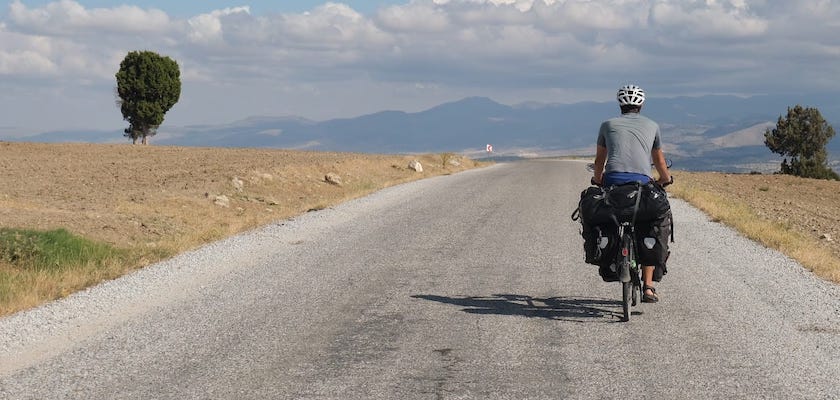
The couple have put all their belongings into storage and managed to fit their lives for the next year into just nine bags – along with a range of gadgets and gizmos to make life a bit easier.
Matt added: “My favourite thing for the trip is a device that converts energy from the bike pedalling into a charger so we can charge our devices!”
While they are missing their families, friends – and real beds – they praised their supporters for their prayer, support and sponsorship.
“They’re all sad to see us go but we have had so much helpful advice and they can track our location when they like, so that helps them,” said Matt.
The Morleys set off on their trek on 30 May and have already travelled through Spain, Italy, Croatia, Bosnia and Herzegovina, Montenegro, Albania, North Macedonia, Greece, Turkey, Georgia, Uzbekistan, Tajikistan. They are covering all costs themselves and donating all funds raised to Mercy Ships.
If you would like to donate to Matt and Coco's JustGiving page, please click here.





